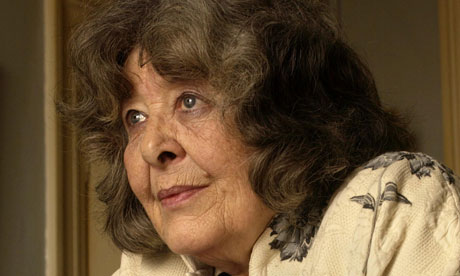 |
| Diane Wynne Jones (guardian.com) |
I have just finished reading Diana Wynne-Jones’ last novel, “Enchanted Glass”. It was published in 2010, and she was clearly intending it to be the first volume of a series, but she died in 2012. I am sorry we will not see the sequel.
The book tells the story of a magician, Andrew, who inherits his grandfather’s old house just outside a small English village, where he lives with his equally magically-talented young cousin Aidan. Andrew discovers that his grandfather, also a powerful magician, had the duty of protecting the territory for about ten miles around, and that this task has now devolved upon him. His first task is to walk the entire boundary of his field-of-care. He and Aidan undertake this task.
The boundary is not reliably marked. There are indications that there was once a path around it, but it has become overgrown, ploughed up, and in places actively obstructed with barbed wire and fencing by a force or forces unknown. Andrew and Aidan can however find the unmarked boundary by trusting their innate sense of where it is; they can ‘feel’ it when they cross it. Inside the boundary, in the area that is in Andrew’s charge, everything feels “what he now thought of as normal: deep and slightly exciting.” The other side feels, as Aidan says, “boring and dangerous … like standing on a runway in the path of an aeroplane. Flat, but you’re lucky you’re not dead.” So he and Aidan navigate the boundary by feeling their way between “deep and exciting” and “flat and dangerous”.
This description resonated strongly for me. “Flat and dangerous” is how the world feels for me when I’m depressed, or anxious. It’s hard to explain how the world can simultaneously be dull, and full of danger. But that is how it feels, when I imagine a world in which God does not exist.It’s not that a world without God has no danger – quite the contrary – it’s that it seems so pointless. The world seems paper thin, and there is nothing beyond what I see.
But “deep and exciting” is how the world feels for me on those days when my faith is stronger; when I feel surer that God does exist, and that there is a point to things. People matter; lives matter; it is our job to care for and protect each other because we all have infinite significance, and the world itself is our charge, our field-of-care, to protect and nurture. This is how I feel on the days when I am more open to the Holy Spirit. This is how it feels, I think, to come home.
In “Enchanted Glass”, Diana Wynne Jones tells us that that feeling is a perception of something real - that when we feel that the world is “deep and exciting”, it’s because it is. We shouldn’t ignore that feeling when we have it. It tells us that we’re in the presence of the holy, and that the holy is all around us, every bit as real as the material world. “Walking the boundary” is necessary, to care for and protect it, in a world that often feels flat, dangerous, and dull. And walking the boundary is best done, as Aidan and Andrew do, in the company of someone who feels the holy too.
Diana Wynne Jones’ books often give me the same sense CS Lewis’ youth novels do, of engaging with important issues, and giving the reader not only something to think about, but the tools to think about it with. They show us how to accept the holy as a real thing, that we are right to feel, and pay attention to. Wynne Jones isn’t writing direct Christian allegory, as Lewis did; but she is writing about the kingdom of God, about what love and community look like and how much they matter. It feels, when I read them, as if Diana Wynne Jones is walking the boundary with me.
